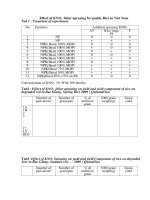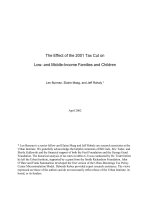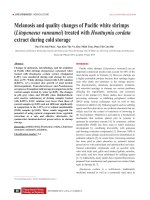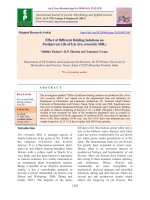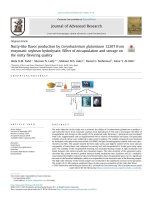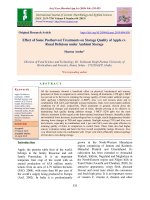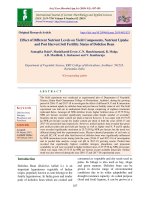Effect of cold storage on post storage life of gerbera (Gerbera jamesonii) cut flowers at ambient conditions
Bạn đang xem bản rút gọn của tài liệu. Xem và tải ngay bản đầy đủ của tài liệu tại đây (504.27 KB, 6 trang )
Int.J.Curr.Microbiol.App.Sci (2018) 7(10): 2382-2387
International Journal of Current Microbiology and Applied Sciences
ISSN: 2319-7706 Volume 7 Number 10 (2018)
Journal homepage:
Original Research Article
/>
Effect of Cold Storage on Post Storage Life of Gerbera (Gerbera jamesonii)
Cut Flowers at Ambient Conditions
Mansute Ajinkya*, P.B. Jadhav, D.B. More and K.P. Pokharkar
Ecofrost Technologies Pvt. Ltd., Survey No 134/1, 134/2,130/3, Jeevan Nagar, Tathawade,
Pune, Maharashtra - 411 033, India
*Corresponding author
ABSTRACT
Keywords
Gerbera (Gerbera
jamesonii), Ecofrost,
Flowers
Article Info
Accepted:
18 September 2018
Available Online:
10 October 2018
Storage at 4ºC with 95% RH was evaluated as the best condition to
maintain the shelf life of gerbera flowers of different varieties. Flower buds
were packed in plastic bag and immersed in water, and then stored at
ambient and also inside cold room of Ecofrost. Post storage life of gerbera
decreased with increase in storage duration. The cold room stored flowers
had shown post dry storage life 2.5 hours in ambient condition, even after
taken out after 13 days of cold storage.
Introduction
The Gerbera (Gerbera jamesonii) is a member
of the daisy family, and is also known as the
Gerbera, African or Transvaal daisy. First
encountered in South Africa, the Gerbera is
also native to tropical regions in Asia and
South America. All gerbera varieties have a
central capitulum, which is composed of
hundreds of individual flowers, surrounded by
numerous florets creating the shape of a daisy.
It is the most important commercially used
5thcut flower in the world after Rose,
Carnation, Chrysanthemum, and Tulip.
Gerbera is commercially available in two
categories - Large Gebera, simply called
'gerbera' and Mini Gerbera, called 'germini'.
Gerbera is available in diameters up to 12 cm
and gernini up to 7 cm and are available in
100's
of
varieties
and
colors
( />Gerbera cut flowers are transported from field
to market generally as a dry storage i.e.
without holding in water.
During distant transportation, flowers loose its
water percentage and turgidity, making them
less attractive, loose market appearance and
fetch low market rate.
Our objectives for this experiment are: To test
2382
Int.J.Curr.Microbiol.App.Sci (2018) 7(10): 2382-2387
the post storage life of Gerbera flowers (by
dry method)
To check the vase life of Gerbera cut flowers
under cold and ambient conditions (by wet
method).
Materials and Methods
The present investigation entitled ‘effect of
cold storage on post storage life of Gerbera cut
flowers at ambient conditions” was
undertaken at Ecofrost Technologies Pvt. Ltd.
Tathawade, Pune, Maharashtra under the
supervision of Mr. D. B. More, Head of
Customer Consulting Cell (CCC) department
during first week of September, 2018.
Experiment was carried out at Ecofrost cold
Room No. E011501A016. The climate of
Tathawade, Pune was hot and semi-arid with
the mean annual rainfall of 722mm, mostly
received from 1stJune to 15th October
( />
Remaining 90 flowers were immersed in tap
water and kept inside cold room condition
(4°C with 93% RH) (photo 2).
The cut flowers were stored in bunches of 10
flowers/bunch. Individual flower buds were
covered by plastic pocket closed at sepal
side/stem side and open towards petal side.
Each stem was given slanting cut of around
45°C at the end with sharp tool to ensure
maximum contact area with water and
reducing emboli or air bubbles.
Randomly 4 flowers were taken out each day
from cold storage to ambient condition to
check its post storage life with and without
holding in water. Flowers were monitored
after every an interval of thirty minutes.
After observing for 24, 48, 36& 72 hours, in
dry storage, flowers were again kept in water
to check whether it recuperate its original
turgidity and strength or not.
Results and Discussion
Different gerbera cultivars with good
commercial value in local market were
selected for the present investigation. The
selected flowers of different cultivars were
harvested, when outer ray of disc florets was
completely elongated and the outer two rows
of disc florets were perpendicular to the
flower stalk and having 45 to 60 cm of stem
length.
The Gerbera varieties having yellow
(Imperial), white (Dalma), orange (Dune)
petal colors were brought to the Agricultural
Laboratory of Ecofrost Technologies Pvt. Ltd,
Tathawade from APMC flower market, Pune
without mechanical damage and they were
kept in clean water under ambient condition.
Total 100 flowers of Gerbera were brought,
out of which 10 flower stems immersed in tap
water and kept at ambient condition (photo 1).
Fresh cut flowers took 12 hours to bend its
neck and lose turgidity in ambient conditions.
Flower samples of different cultivars were
taken out from cold room on day 1, day 2 and
day 3 and placed at ambient conditions where
the moisture loss and symptoms of shriveling
were seen, and it was observed that the neck
started bending in 10.5, 9 and 8.5 hours;
respectively.
On day 4 and day 7, flowers samples of
different cultivars were taken out from cold
room and placed under ambient condition (dry
storage). It was observed to misplace its
attractiveness and firmness in 7 hours and 5.5
hours; respectively.
Flowers sample of different varieties were
taken out from cold room on day 5 to day 6
2383
Int.J.Curr.Microbiol.App.Sci (2018) 7(10): 2382-2387
and day 8 to day 9 and placed at ambient
conditions, which resulted in dehydration of
flowers within 6 and 5 hours; respectively.
Flowers samples were taken out from cold
room on day 10, day 11 to day 12 and day 13;
which resulted in dehydration and bending its
neck in 4, 3.5 and 2.5 hours at ambient
conditions; respectively (Figure 1). Shelf life
was measured as 4 days in vase treated
flowers (holding in tap water) stored at
ambient condition.
turgidity and attractiveness and stem strength.
Ray florets of flower become dull.
Flowers kept in water after 24 and 36 hours of
dry storage regain its strength and turgidity
within 8 and 12 hours; respectively.
Flowers after 48 to 72 hours of dry storage
struggled to rehydrate.
Within 10.5 to 2.5 hours, all flowers were
observed to lose more than 25% moisture,
Only 50% of flowers were regained their
turgidity and strength. The bacterial infections
occurred only in the area submerged with
water. Remaining portion of stem was found
intact.
Photo.1 Gerbera flowers stored at ambient
conditions
Photo.2 Gerbera flowers stored inside Ecofrost
cold storage (4°C and 93% RH)
2384
Int.J.Curr.Microbiol.App.Sci (2018) 7(10): 2382-2387
Photo.3 Gerbera flowers were taken out after 3
days from cold room and kept in dry storage (0
hour)
Photo.4 Gerbera flowers were taken out after
3 days of cold room and place in ambient
conditions (3 hours in dry storage)
Photo.5 Gerbera flowers were taken out after 3
days from cold room and placed at ambient
conditions (8 hours in dry storage)
Photo.6 Gerbera flowers were taken out from
cold room after 3 days and held at ambient
conditions (12 hours in dry storage)
Photo.7 Gerbera flowers were taken out from
cold room after 3 days and held in ambient
conditions for 18 hours in dry storage and
again held for 10 hours under water holding
conditions
Photo.8 Gerbera flowers were taken out from
cold room after 3 days and held in ambient
conditions for 18 hours in dry storage and 10
hours for vase treatment (only water)
2385
Int.J.Curr.Microbiol.App.Sci (2018) 7(10): 2382-2387
Photo.9
Photo.10
Gerbera flowers after 7 days of cold storage, 24 hours in dry storage& 18 hours of hydration
Photo.11 8 days old bacterial infected stem of
gerbera flowers at ambient conditions
Photo.12 Bacterial infected stem of gerbera flowers
after 5 days at ambient conditions
Photo.13 Healthy stems of gerbera flower after 13 days in cold storage (4°C and 93 % RH)
2386
Int.J.Curr.Microbiol.App.Sci (2018) 7(10): 2382-2387
Cold stored flowers had shown good vase life,
firmness and very less bacterial infections.
Water retention of flowers was better in cold
stored flowers than ambient stored flowers.
Very less deterioration in quality of Gerbera
flowers was observed inside cold room upto
initial fourteen days.
Gerbera flowers had 8 to 4 hours of dry post
storage life at ambient conditions, reducing
with increase in number of days flowers held
inside cold room.
Flowers of different cultivars of gerbera were
held at ambient conditions, which were
susceptible to bacterial infection in stem
(xylem) causing water imbalance in flower.
After 24 to 36 hours of dry storage, flowers
were observed to regain its turgidity within 8
to 12 hours under hydration treatment.
Flowers beyond 48 to 72 hours of dry storage
had more difficulty in regaining its original
strength by absorbing water.
Cold stored flowers were less susceptible to
bacterial infection as compared to flowers
kept in ambient condition (photo 11 and 12).
Post storage life gerbera decreased with
increase in storage duration.
The cold room stored flowers had shown post
dry storage life 2.5 hours in ambient condition
even after cold store period of 13 days.
Acknowledgement
Author thankful to the Director, Ecofrost
Technologies Pvt. Ltd., Jeevan Nagar,
Tathawade, Pune, Maharashtra, 411 033 for
providing excellent facilities for conducting
this research. Financial assistance provided by
the Ecofrost Technologies Pvt. Ltd. Pune,
Maharashtra, India is highly appreciated.
References
/> />
How to cite this article:
Mansute Ajinkya, P.B. Jadhav, D.B. More and Pokharkar, K.P. 2018. Effect of Cold Storage on
Post Storage Life of Gerbera (Gerbera jamesonii) Cut Flowers at Ambient Conditions.
Int.J.Curr.Microbiol.App.Sci. 7(10): 2382-2387. doi: />
2387

